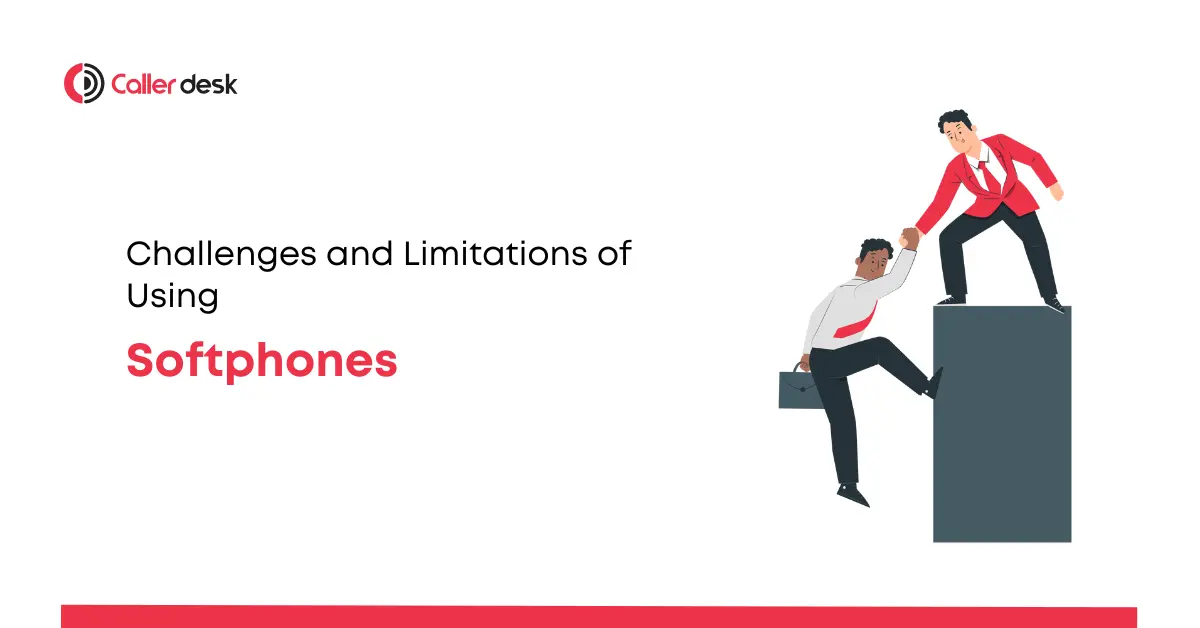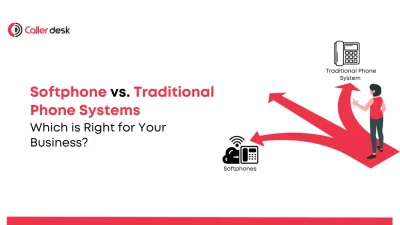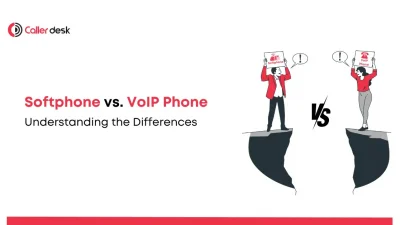Softphones have revolutionized the way businesses communicate. Powered by Voice over Internet Protocol (VoIP) technology, softphones allow organizations to make and receive calls over the internet using devices such as computers, smartphones, and tablets. Their flexibility, cost-efficiency, and advanced features make them an ideal solution for remote and hybrid work models, which have become increasingly prevalent in today’s business landscape.
However, like any technology, softphones come with their own set of challenges and limitations. For businesses in India, where internet infrastructure, cybersecurity, and network reliability are often variable, these issues can significantly impact communication efficiency and business operations.
In this article, we’ll explore the key challenges of using softphones, particularly for Indian businesses, and offer practical solutions to help organizations overcome these limitations.
Key Challenges and Limitations of Softphones
While softphones bring a host of benefits, such as enhanced mobility, cost savings, and seamless integration, they also present challenges that need to be addressed to maximize their effectiveness. Let’s delve into these challenges and explore ways to tackle them.
1. Internet Dependence: A Critical Issue in India
Challenge:
Softphones require a stable and high-speed internet connection to function effectively. In India, network reliability can vary widely depending on the region, with Tier-2 and Tier-3 cities often experiencing slower speeds and frequent disruptions. During peak hours, network congestion can lead to dropped calls, low voice quality, and delayed communication.
Limitation:
Without internet access, softphones become non-functional. Power outages or service disruptions can halt business operations entirely, leading to missed opportunities and delayed resolutions.
Solution:
- CallerDesk’s Optimized VoIP Features: CallerDesk ensures seamless performance even in low-bandwidth environments, making it an excellent choice for Indian businesses.
- Invest in redundant internet connections or backup service providers to avoid downtime during network disruptions.
- Prioritize VoIP traffic using Quality of Service (QoS) settings to allocate sufficient bandwidth for softphone communication.
2. System Compatibility and Integration Challenges
Challenge:
For businesses operating with legacy systems or outdated devices, softphones may not integrate smoothly with existing hardware and software. Compatibility issues can hinder performance or even prevent the softphone from functioning altogether.
Limitation:
Older devices may lack the processing power needed to run softphone applications efficiently, leading to crashes or poor performance.
Solution:
- CallerDesk Advantage: CallerDesk softphones are designed to integrate seamlessly with both modern and legacy systems, ensuring compatibility across Windows, macOS, Android, and iOS platforms.
- Perform pre-installation compatibility checks to identify potential issues before deployment.
- Gradually upgrade outdated hardware to improve compatibility and performance.
3. Audio Quality: Addressing Indian Network Challenges
Challenge:
Inconsistent internet connectivity, particularly in regions with limited 4G/5G coverage, can result in audio glitches like echoes, delays, and dropped calls. For businesses relying on VoIP for critical operations, these issues can disrupt workflows and negatively impact customer interactions.
Limitation:
Poor audio quality not only frustrates employees but also diminishes customer satisfaction and erodes trust in the business.
Solution:
- CallerDesk’s Noise Reduction Technology: Advanced audio optimization ensures crystal-clear voice quality, even on congested networks.
- Use high-quality headsets and microphones to enhance sound clarity and reduce background noise.
- Regularly test and optimize network settings to ensure smooth call performance.
4. Security Risks: Safeguarding Sensitive Data
Challenge:
As softphones operate over the internet, they are vulnerable to cyber threats such as hacking, phishing, and eavesdropping. Indian businesses, particularly SMEs, often lack the robust cybersecurity measures needed to protect sensitive communication.
Limitation:
Without proper safeguards, softphone systems can expose confidential customer and business information to cybercriminals.
Solution:
- CallerDesk’s Secure Ecosystem: Features like end-to-end encryption, two-factor authentication, and firewalls ensure maximum security for all communication.
- Train employees to recognize phishing attempts and implement company-wide cybersecurity protocols.
- Schedule regular security audits to identify and address potential vulnerabilities.
5. Limited Emergency Call Support
Challenge:
Softphones often face limitations when connecting to emergency services. Unlike traditional phone systems, softphones may not provide accurate location information, making it difficult for responders to act swiftly in critical situations.
Limitation:
The lack of reliable emergency call support can pose serious risks, especially in industries like healthcare, logistics, or field services.
Solution:
- CallerDesk’s Emergency Call Routing: Offers customized solutions to ensure critical calls are prioritized and routed appropriately.
- Keep mobile phones or landlines as backup communication tools for emergencies.
6. Network Reliability: A Common Indian Concern
Challenge:
Indian businesses operating in rural areas or regions with limited network infrastructure often face frequent call drops and intermittent connectivity, affecting the usability of softphones.
Limitation:
Shared networks in offices or co-working spaces can also lead to bandwidth contention, further degrading call quality.
Solution:
- CallerDesk’s VoIP Prioritization Features: Automatically prioritizes VoIP traffic to ensure reliable communication during peak hours.
- Opt for dedicated internet connections for larger teams to separate VoIP data from general usage.
7. User Training and Adoption
Challenge:
Employees accustomed to traditional phones may find it challenging to adapt to softphone technology, leading to frequent errors and inefficiencies.
Limitation:
Without adequate training, employees may not utilize the full range of softphone features, reducing overall productivity.
Solution:
- CallerDesk’s User-Friendly Interface: Designed for ease of use, minimizing the learning curve for new users.
- Provide interactive training sessions, tutorials, and on-demand support to ensure smooth adoption.
8. Hardware Requirements: Balancing Cost and Performance
Challenge:
Softphones require devices with sufficient processing power and modern operating systems. Older hardware may struggle to handle the demands of VoIP applications.
Limitation:
Upgrading hardware can involve significant costs, particularly for small businesses with tight budgets.
Solution:
- CallerDesk’s Lightweight Application: Optimized to deliver high performance even on mid-range devices.
- Plan phased hardware upgrades, focusing on critical devices first.
Why CallerDesk Softphones Are Perfect for Indian Businesses
CallerDesk is uniquely positioned to address the challenges of using softphones in India.
- Optimized for Indian Networks: Ensures reliable call quality even in regions with bandwidth limitations.
- Advanced Security Measures: Protects against evolving cyber threats with encryption and real-time monitoring.
- Affordable Pricing Plans: Scalable options tailored to the needs of Indian SMEs and enterprises.
- 24/7 Support: Dedicated local support teams to assist with troubleshooting and onboarding.
Conclusion
Softphones are an essential tool for modern businesses, offering unmatched flexibility, cost savings, and advanced features. However, challenges like network reliability, security risks, and user adoption must be addressed to maximize their potential.
By choosing CallerDesk, Indian businesses can overcome these limitations with customized solutions, robust security, and seamless integration, ensuring smooth and efficient communication.
Ready to take your communication to the next level? Schedule a free demo with CallerDesk today and experience the future of business communication!
Frequently Asked Questions
1. What is a softphone, and how does it work?
A softphone is a software-based phone application that enables internet-based calling using VoIP technology. It works on devices like computers, smartphones, or tablets, converting voice into digital signals and transmitting them online.
2. What are the main challenges of using softphones in India?
Softphones in India face challenges like network instability, internet congestion, and inconsistent bandwidth, especially in areas with limited 4G/5G coverage. These issues can cause dropped calls and poor audio quality.
3. How can businesses address internet dependency issues with softphones?
Businesses should invest in a reliable, high-speed internet connection and have backup options to ensure uninterrupted connectivity. CallerDesk offers VoIP-optimized solutions for better performance even on limited networks.
4. Are softphones secure for business communication?
Yes, but proper security measures like encryption, firewalls, and regular updates are essential to protect sensitive data. CallerDesk provides advanced security features, ensuring compliance with global standards like GDPR.
5. How do softphones handle emergency calls?
Softphones often lack direct access to emergency services and cannot share location data. Businesses should maintain a backup mobile or landline for emergencies, while CallerDesk offers custom call routing for critical situations.
6. Can softphones integrate with existing business tools?
Yes, softphones integrate seamlessly with CRMs, email, and project management tools. CallerDesk supports popular integrations like Salesforce and HubSpot for enhanced productivity and real-time customer insights.
7. What steps can businesses take to improve audio quality on softphones?
Businesses can prioritize VoIP traffic, invest in quality headsets, and regularly monitor network performance. CallerDesk’s VoIP-optimized features minimize latency and ensure clear communication.
8. Are softphones suitable for remote teams in India?
Absolutely. Softphones enable remote teams to stay connected from any location, offering features like video calls, messaging, and file sharing. CallerDesk ensures reliable connectivity, even in areas with inconsistent networks.
9. Do softphones require high-end devices to function?
Softphones don’t require high-end devices but need modern hardware for smooth performance. CallerDesk softphones are designed to work on a wide range of devices without frequent upgrades.
10. Why should Indian businesses choose CallerDesk for softphone solutions?
CallerDesk addresses challenges like network reliability, offers robust security, and integrates with popular tools. Its scalable plans and local support make it ideal for Indian businesses.
11. How can businesses encourage employees to adopt softphone technology?
Providing training and ongoing support can help employees adapt quickly. CallerDesk’s intuitive interface simplifies the transition and ensures ease of use.
12. What backup options should businesses keep for emergencies?
Businesses should maintain alternate communication methods, such as mobile phones or landlines. CallerDesk’s custom call routing features offer additional backup options for critical situations.





